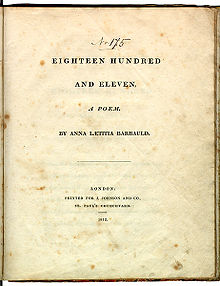|
Eighteen Hundred and Eleven Eighteen Hundred and Eleven: A Poem (1812) is a poem by Anna Laetitia Barbauld criticising Britain's participation in the Napoleonic Wars. AnalysisBritain had been at war with France for a decade and was on the brink of losing, when Barbauld presented her readers with her shocking Juvenalian satire. She argued that the influence of Great Britain was waning and the influence of the United States was waxing. It was to the United States that Britain's wealth and fame will now go, she contended, and Britain will become nothing but an empty ruin. She tied this decline directly to Britain's participation in the Napoleonic Wars:
This pessimistic view of the future was, not surprisingly, poorly received; "reviews, whether in liberal or conservative magazines, ranged from cautious to patronizingly negative to outrageously abusive."[1] Barbauld, stunned by the reaction, retreated from the public eye; in fact, she never published another work within her lifetime. Even when Britain was on the verge of winning the war, Barbauld could not be joyous. She wrote to a friend: "I do not know how to rejoice at this victory, splendid as it is, over Buonaparte [sic], when I consider the horrible waste of life, the mass of misery, which such gigantic combats must occasion."[2] Everard Green noted that "In her own time, the idea that the United States – then still mainly reckoned a minor and peripheral power – would one day eclipse the mighty British Empire was greeted with scorn. Indeed, at the time when the poem was written, Britain was yet to reach its zenith as a world power. Yet what Barbauld predicted did come to pass, though very much later – not due to the Napoleonic Wars, but due to the Second World War."[3] See also
NotesBibliography
External links |
Portal di Ensiklopedia Dunia